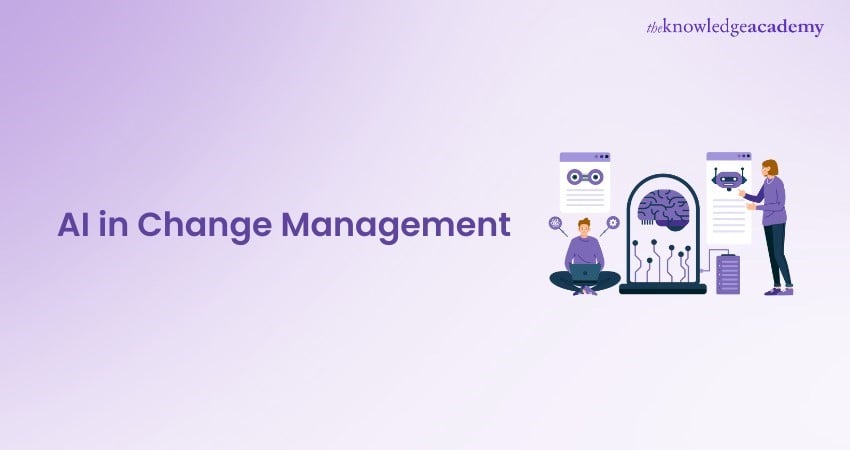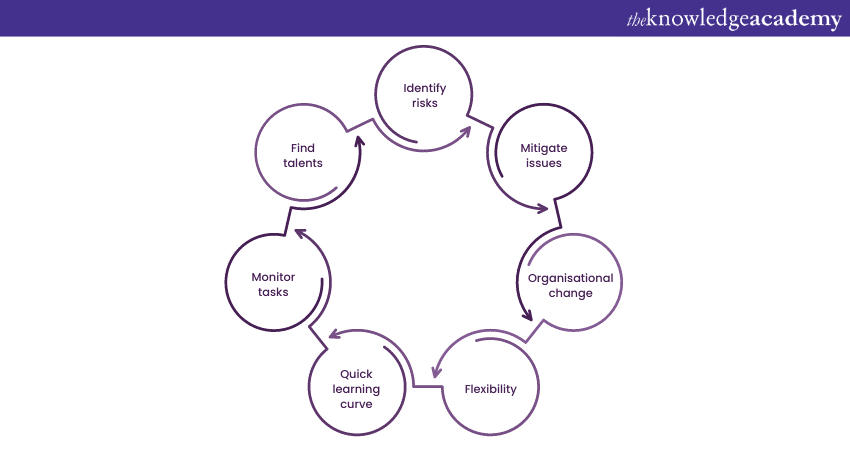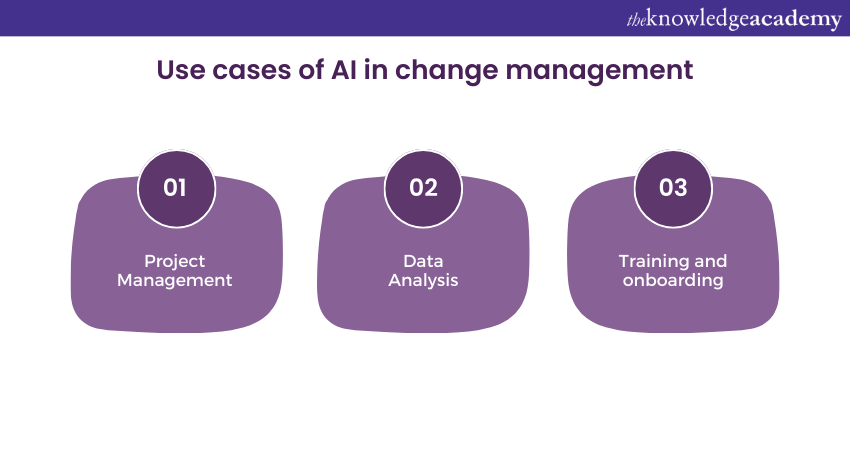We may not have the course you’re looking for. If you enquire or give us a call on +91-181-5047001 and speak to our training experts, we may still be able to help with your training requirements.
Training Outcomes Within Your Budget!
We ensure quality, budget-alignment, and timely delivery by our expert instructors.

Change Management is an extremely crucial process used by many organisations to make organisational changes. However, it can be a daunting process with lots of challenges, and that’s where Artificial Intelligence (AI) comes in. Understanding the role of AI in Change Management can help you overcome any challenges as well as successfully transition to a new approach. Want to know how AI can transform the Change Management process? Read this blog to discover the game-changing influence of AI in Change Management. Learn how to embrace the future of managing change through AI-driven technologies.
Table of Contents
1) What is Change Management?
2) The role of AI in Change Management
3) Benefits of AI Change Management
4) How to Implement AI in Change Management?
5) Use cases of AI Change Management
6) Conclusion
What is Change Management?
Change Management is not just about telling people about changes taking place in an organization, like when a new system is coming, or when a company is bought. It involves more than just a communication plan where top leaders or Project Managers announce the changes suddenly and the team has to implement strategies to cope with those changes. Change management tools are essential in facilitating structured processes, managing resistance, and ensuring effective implementation of changes throughout the organization.
For a change to be successful, Change Managers must equip and support the employees with necessary inputs. The ultimate aim of Change Management, guided by various change management models, is to help individuals adapt to change and help the organisation become more successful.

The role of AI in Change Management
Artificial Intelligence (AI) in Change Management has the potential to play a massive role while an organisation is undergoing through changes. It can revolutionise the work of Change Managers by providing them with real-time data of all the activities.It can effectively predict future events and challenges by analysing the data flow and offering measures to fix them. Change management principles help in making informed decisions in utilising AI solutions.
By using this technological marvel, Change Managers can take corrective measures before they are even required. The best part is that some issues don’t need any manual intervention and can be fixed automatically with the help of an AI. In such cases, they will be notified of the changes executed by the AI, and there’s no need for them to intervene. So, it helps deliver projects on time by speeding up the Change Management Processes.
Get ready for your interview with our top Change Management Interview Questions.
Benefits of AI in Change Management
There are many benefits of implementing AI in Change Management. Let’s take a look at some of them below:

1) Identify risks: Implementing Artificial Intelligence (AI) in Change Management makes it easy for Change Management teams to identify issues quickly.
2) Mitigate issues: Other than identifying risks and issues, AI in Change Management can fix the identified issues using the Change Management Best Practices.
3) Organisational change: At times, many organisations fail to implement proper changes due to challenges like organisational hierarchy. AI, however, is impartial, does not worry about such hierarchies and will execute the required changes without hesitation. So, using AI technologies can result in faster organizational Change Management.
4) Flexibility: AI technologies are extremely flexible as they can be used interchangeably wherever and however long they are needed.
Discover the Best Change Management Books! Read our top picks and transform your organization today!
5) Quick learning curve: Time is a huge constraint for Change Management teams. Moreover, it takes a lot of time to train employees for each project. AI, on the other hand, can learn at a rapid speed and can be trained and deployed at a much faster rate.
6) Monitor tasks: AI technology can be used to oversee tasks like meetings and documentation to make sure they effectively fix the issues identified previously. Most importantly, it ensures all the processes implemented are based on sound logic without any bias.
7) Find talents: AI can effectively analyse humungous data resources like job portals and HR files to find talents with the right skills. This can reduce the training needed as the talents identified by AI will already possess the skills needed.
Become a certified Change Management professional with our Certified Professional Change Management CPCM Course - sign up now!
How to implement AI in Change Management?
Implementing Change Management AI has a lot of advantages, but that doesn’t mean you have to rush and implement a random AI technology. Organisational Change Management should be proceeded with caution, and the following steps can help you with that:
1) Select the right solution: These days, everyone’s in a rush to bring in AI due to its recent hype. but it’s worth remembering that haste makes waste. So don’t be in a rush to choose an AI technology; instead, take your time and find the right solution specific to your needs.
2) Define your expectations clearly: Setting clear expectations early on can help you find the optimal AI solution for your Change Management needs. Clearly define what you expect from the solution, whether its superior processing capabilities or less learning curve required and set them straight.
3) Be transparent: Be transparent on the approach with the AI technology. So, let your team know what and how you are planning to use it.
These are just a few factors to consider before you implement an AI in Change Management processes. However, do consider other parameters based on your specific needs.
Dive into the detailed Case Study on Change Management.
Use cases of AI in Change Management
AI in Change Management has many applications in today’s world. Let’s take a look at some of them below:

1) Project Management: Project Managers often spend the majority of their time on repetitive tasks. However, Implementing AI technology can help automate those tasks and let them focus on important tasks that need more attention. Moreover, it helps them find new insights using their analytical capabilities.
2) Data analysis: Since AI uses a predictive modelling approach to make its decisions, it can also be used to predict possible outcomes for a Change Management project. Apart from this, using its analytical capabilities, you can identify patterns as well as find the synergy level of your team members.
3) Training and onboarding: Whenever a Change Management project requires adapting a new process or technology, the level of engagement from the team often tends to be low. This is mainly due to the time and effort invested to learn something new to do the same process. You can overcome this by incorporating AI into training and onboarding.
Discover the Impact of Change Management Salaries on Career Growth and Organizational Success!
Conclusion
We hope that after reading this blog, you have understood the role of AI in Change Management. Implementing Artificial Intelligence in your organisation's Change Management process has a lot of advantages and can revolutionise the operations of your organisation. So, let’s embrace this revolution with open arms!
Learn how to implement changes effectively with our Change Management Training - sign up now!
Frequently Asked Questions

AI revolutionises Change Management by offering data-driven insights, predicting potential roadblocks, and optimising strategies for seamless transitions. Through sentiment analysis, AI gauges employee attitudes, aiding in crafting tailored communication plans. Machine Learning algorithms analyse past change initiatives to identify patterns and refine future approaches.

AI is revolutionising the workplace by automating tasks, enhancing Data Analysis, improving customer service, and facilitating collaboration. It’s driving job creation, augmenting staff performance, and enabling strategic business decisions while raising concerns about data security and bias.

The Knowledge Academy takes global learning to new heights, offering over 30,000 online courses across 490+ locations in 220 countries. This expansive reach ensures accessibility and convenience for learners worldwide.
Alongside our diverse Online Course Catalogue, encompassing 17 major categories, we go the extra mile by providing a plethora of free educational Online Resources like News updates, Blogs, videos, webinars, and interview questions. Tailoring learning experiences further, professionals can maximise value with customisable Course Bundles of TKA.

The Knowledge Academy’s Knowledge Pass, a prepaid voucher, adds another layer of flexibility, allowing course bookings over a 12-month period. Join us on a journey where education knows no bounds.

The Knowledge Academy offers various Change Management Certification Courses, including Change Management Foundation, Change Management Practitioner, and more. These courses cater to different skill levels, providing comprehensive insights into the Different Types of Project Managers.
Our Project Management blogs covers a range of topics related to Change Management, offering valuable resources, best practices, and industry insights. Whether you are a beginner or looking to advance your Project Management skills, The Knowledge Academy's diverse courses and informative blogs have you covered.
Upcoming Project Management Resources Batches & Dates
Date
 Change Management Foundation & Practitioner
Change Management Foundation & Practitioner
Mon 6th Jan 2025
Mon 13th Jan 2025
Mon 20th Jan 2025
Mon 27th Jan 2025
Mon 3rd Feb 2025
Mon 10th Feb 2025
Mon 17th Feb 2025
Mon 24th Feb 2025
Mon 3rd Mar 2025
Mon 10th Mar 2025
Mon 17th Mar 2025
Mon 24th Mar 2025
Mon 31st Mar 2025
Mon 7th Apr 2025
Mon 28th Apr 2025
Mon 12th May 2025
Mon 19th May 2025
Mon 9th Jun 2025
Mon 23rd Jun 2025
Mon 7th Jul 2025
Mon 21st Jul 2025
Mon 4th Aug 2025
Mon 18th Aug 2025
Mon 1st Sep 2025
Mon 15th Sep 2025
Mon 29th Sep 2025
Mon 13th Oct 2025
Mon 20th Oct 2025
Mon 27th Oct 2025
Mon 3rd Nov 2025
Mon 10th Nov 2025
Mon 17th Nov 2025
Mon 24th Nov 2025
Mon 1st Dec 2025
Mon 8th Dec 2025
Mon 15th Dec 2025







 Top Rated Course
Top Rated Course


 If you wish to make any changes to your course, please
If you wish to make any changes to your course, please


